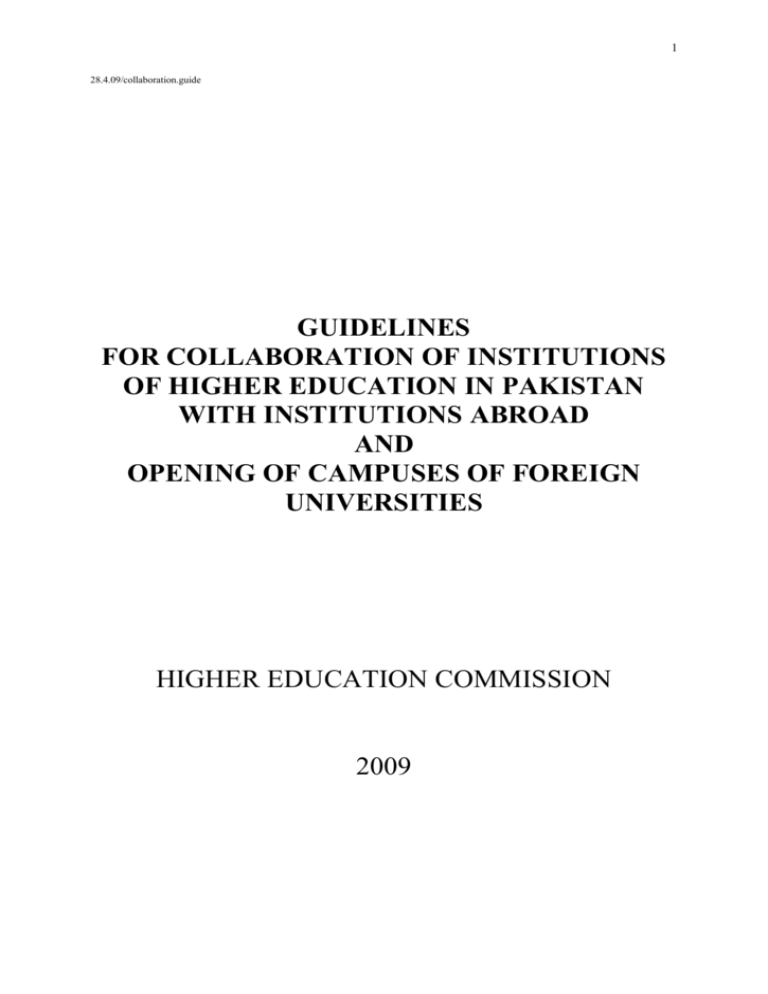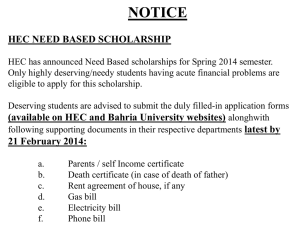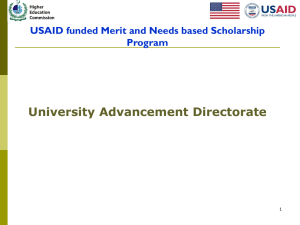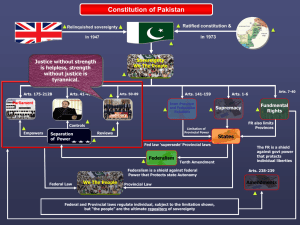28 - Higher Education Commission
advertisement

1 28.4.09/collaboration.guide GUIDELINES FOR COLLABORATION OF INSTITUTIONS OF HIGHER EDUCATION IN PAKISTAN WITH INSTITUTIONS ABROAD AND OPENING OF CAMPUSES OF FOREIGN UNIVERSITIES HIGHER EDUCATION COMMISSION 2009 2 FOREWORD Despite rapid expansion of higher education, the public and private sectors, in view of resource constraints, is unable to cope with the escalating demand of higher education by growing student population in Pakistan. The Government envisages that the need for higher education to growing student population can be met through collaboration with reputable foreign universities which will open new avenues for them. Many of the foreign universities and institutions who are contemplating to establish such links and collaborations may not be sure about the regulatory framework on this aspect will find the present brochure a useful document for their information and guidance. The scope of the document is confined to providing guidelines which have been prescribed by the HEC for collaboration and franchising with foreign universities/institutions and opening off shore campuses. It does not intend to bypass or overrule any of the requirements or guidelines which may have been prescribed by the respective Provincial Education Departments in this connection. Prof. Dr. S. Sohail H. Naqvi Executive Director, Higher Education Commission May 2009 3 Guidelines For collaboration of institutions 0f higher education in Pakistan with institutions abroad and opening of campuses of foreign universities 1. Introduction 1.1 There is an increasing mobility of students, academic staff as a result of internalization of higher education and globalization process. As a result a rapid increase in cross border higher education is being witnessed with intense competition among universities/institutions of the developed world for seeking collaboration/operation of campus at overseas locations. Despite rapid expansion of higher education, the government is unable to cope with the escalating demand of burgeoning student population. Thus, there is a pressure on the government to increase assess to higher education. Cross border education provides yet another avenue to meet the challenge. Many of the foreign universities are keen to operate in Pakistan. Therefore there is a need to regulate this emerging sector and ensure quality in the provision of higher education. 1.2 The purpose of this document is to provide policy guidelines and set out criteria, procedures for collaboration with foreign institutions/universities and opening up campuses of reputable foreign universities. It identifies various related requirements, which need to be fulfilled and adhered to while negotiating collaborative arrangements or for operation of offshore campuses of foreign universities in Pakistan. 1.3 The collaborative arrangement being encouraged by the Commission may have various modes and forms, which may be either of the following: i) A campus entirely run by a foreign university without a local partner and award degree by a foreign university identical to degrees given to on-campus students at principal seat. ii) Local campus franchised by a foreign university for award of a foreign degree where students are assessed and evaluated locally and degree awarded by a foreign university; iii) A campus managed by a local partner but academic programme run under splitdegree basis or twinning arrangements wherein part of study is completed in a local institution and remaining part in a university abroad or whole of programme is completed in Pakistan and evaluation and assessment is carried out under supervision of authorized agency like the British Council in case of British Universities. iv) External degree programme for which tuition/facilitation is provided by a local institution, while course of study, study materials, question paper and assessment is done by universities/institutions under supervision of 3rd party like British Council. 1.4 This document takes into account all such forms of collaboration. The only exception is the distance-learning programme, which does not involve any collaborative arrangements and therefore is not included in this document. 4 2. Definitions 2.1 In this criteria any thing repugnant on the subject or context used hereinafter: a) ‘collaborative arrangement’ means any mode of collaborative arrangement as specified in para 1.3; b) ‘institution’ means franchised institution of higher education seeking collaboration with foreign university; c) ‘Commission’ means Higher Education Commission; d) ‘foreign university’ means franchising foreign university or educational institution, whose degree is to be offered by local institution; e) ‘principal’ means the head of the franchised institution; f) ‘provincial government’ means higher education department of concerned province where institution/offshore campus is being opened/operated. 3 STANDARD OPERATING PROCEDURE (SOPs) FOR COLLABORATION 3.1 The procedure for collaborative arrangements of foreign universities with Pakistani institutions/universities is outlined below: 3.2 Completion of legal formalities 3.2.1 No foreign university, other than accredited/chartered in its country of origin by a body recognized by the Higher Education Commission, would be allowed to operate through any mode as specified herein. 3.2.2 The first step for a Pakistani institution seeking overseas partnership is the fulfilment of legal formalities and registration under the relevant laws of the Companies Ordinance/Societies Registration Act/Trust Act as a Foundation/Society or a Trust. 3.2.3 Franchising university must carry specific provision for its operation overseas through any of the above modes and sponsors of local institutions would be required to submit proof of such a legal provision. 3.2.4. The application of the foreign university/institution seeking to operate in Pakistan or through local collaboration must submit a NO objection certificate form the concerned embassy in Pakistan which will also certify the accredited status of the institution. 3.2.5 The application should give details of physical, human and financial resources, admission procedure, course curricula, fee, and other terms and conditions of collaboration. 3.2.6 The Foreign University/Institution shall submit a Refundable Performance Guarantee Fee (RPGF) in the form of a Demand Draft in favour of "Chairman, HEC payable at Islamabad for an amount not less than Rs.10.00 million or as may be specified from time to time. The Refundable Performance Guarantee Fee shall be refunded to the concerned Institution after a specified period not less than 3 years, but could be carried forward in case of any violation of norms, conditions, and requirements and/or non-performance by the institution and/or complaints against the institution. The Refundable Performance Guarantee Fee (RPGF) shall be kept in the form of FDR. Yearly interest accrued thereon shall be released to the Institution for scholarships/grants to students as per HEC’s Guidelines. 5 3.2.7 The local institution located in provincial territorial jurisdictions would be required to get themselves registered with provincial government and provide proof of registration to the Commission. 3.3 Application for collaborative arrangement 3.3.1 After completion of legal requirements, the sponsors of local institution would submit an inclusive proposal, prepared in light of proforma for collaborative arrangement (Annex – I), accompanying a bank draft of Rs.100,000/- in favour of Higher Education Commission as evaluation fee. The Provincial Education Department/s are also competent to process cases of collaboration for institutions located in their jurisdiction. Before negotiating with the overseas partner, the sponsor/s should verify from the HEC whether the overseas partner is recognized/accredited institution or not. The overseas partner shall certify after satisfying itself from HEC that the Pakistani institution fulfills the required physical, human, financial resources and that due regard has been give to assure quality and standards of degree programme. 3.3.2 The Commission shall scrutinize the proposal submitted by sponsors to ascertain as to whether it fulfills the specified basic requirements or not. If the Commission finds that there is a prima facie case for further consideration, the feasibility report shall be thoroughly scrutinized by a panel or expert to be appointed by the HEC. The panel/expert will assess the application and may ask for additional information or recommend the case for preliminary inspection of the institution. 3.4. Site Inspection 3.4.1 On fulfillment of mandatory requirements in shape of academic, financial and physical infrastructure, physical inspection of institution will be carried out by an inspection committee [comprising the representatives of the Commission and concerned provincial government] to determine that the institution has the potential to run collaborative programmes. In case, physical inspection is carried out by Provincial Education Department/s, an HEC representative will be required to be associated in inspection. The sponsors will be required to submit an inspection fee of Rs.100,000/- to the concerned agency. The visit will require meeting with administrators, students, teaching staff and support services staff. A visit to the library and other learning resources will also be conducted. A detailed inspection visit in some cases may also be required. 3.5 NOC and Recommendation 3.5.1 On satisfactory report by the Inspection Committee, the sponsor/s shall submit the negotiated draft agreement with the overseas partner/s to the HEC for approval. The HEC may call for additional information about the collaboration. A draft MOU/agreement between local partners and foreign university needs to be submitted to Commission for approval. 3.5.2 Once the HEC is satisfied with the arrangement, the institution concerned will be allowed to enter into agreement with a foreign institution and for this purpose the NOC/recommendation letter for collaboration or offshore campus of foreign university will be issued to offer foreign degree programmes. The approval will be initially for three years with periodic monitoring. Section 4.5 refers. 3.5.3 The validity period of permission will initially be for three years and subsequently would be extended to the next term after a positive report from the Inspection Committee. 3.6 Extension in NOC 6 3.6.1 After three years, the approval can be extended subject to a satisfactory report of the Inspection Committee about smooth functioning and substantial progress. 3.6.2 During the period of operation the Institution shall be treated on par with other institutions in Pakistan and shall be governed by all the rules, regulations of HEC issued from time to time. 4 CONDITIONS GOVERNING FOREIGN COLLABORATION 4.1 The provisions for collaborative degree arrangement/functioning of offshore campus shall be governed by the following conditionalities: 4.2 Institutional and academic i). ii). iii). iv). v). vi). vii). viii). ix). x). xi). xii). xiii). That the agreement shall be executed in Pakistan in accordance with Pakistani laws. No arbitration clause shall be included in the MOU/agreement, and in case of litigation if any, the jurisdiction shall be a court in Pakistan; that local institution and foreign university have joint responsibilities to safeguard the interests of students and provisions for quality assurance and maintenance of standards of quality education; that the awarding institution is ultimately responsible for ensuring that the academic standards and quality of learning opportunities offered through a collaborative arrangement are adequate to enable a student to achieve the academic standard required for its award. that the academic quality and standards of educational programmes should be comparable to those of the awarding university/institution. that the degree awarded to students at local institution will identical to the degrees awarded to on-campus students; that the institutions shall be responsible to provide accurate, reliable information on all aspects of educational provisions; that an up-to-date and authoritative record of the collaborative arrangements should be publically available. that students at local institution will be enrolled in principal seat of franchising university. They would be eligible to all rights and privileges including right of transfer to main campus abroad upon closure of local institutions for any reason and to all other rights as are admissible to students at principal seat. that the institution shall be governed by the rules and regulations framed by the franchising university from time to time regarding general scheme of studies, duration of courses, medium of instruction, detailed curricula, examination and assessment pattern, the conditions under which students shall be admitted to the examination of university etc; that the admission of students for a course of study, examination and assessment of requirements should be equivalent to comparable programmes delivered by the awarding institution. that he degree awarded in a professional field should be accredited/recognized by the relevant professional body in Pakistan. that the policies and procedures should ensure that there are adequate safeguards against financial or academic interests of students. that the site selected for the institution must be suitable from academic point of view and possess sustainable financial and physical viability, civic facilities like 7 xiv). xv). xvi). xvii). xviii). xix). xx). xxi). xxii). xxiii). xxiv). provision of water, electricity, fuel gas, telephone, internet with appropriate bandwidth etc; that the institution has framed proper rules/regulations regarding efficiency and discipline of its students, staff and other employees; that institution has well stocked library having not less than 500 books on various themes of subject meet franchised and fully equipped laboratory facilities related to practical facilities for work where collaboration is being extended in any branch of experimental science. For collaboration in Computer and Information Technology fields, well-equipped computer laboratory having internet connectivity of 256 MB preferably with appropriate bandwidth, which can cater to the course needs of students and teachers; that at least 10% of students be granted fee exemptions and scholarships on need basis; that the institutions shall be responsible to provide accurate, reliable information on all aspects of educational provisions; that in case student/s at local institution are unable to continue with degree programme due to any reason, they will have right of transfer to the main campus; that all examinations leading to award of degrees/diplomas/certificates and their checking and evaluation shall be done by foreign university under supervision of 3rd party like the British Council in case of British Universities. that the teaching and other staff should be proficient in terms of qualifications, teaching, research and other professional experience and the conditions of their service are appropriate enough to provide for courses of instruction, teaching and training work to be taken; that the institution must possess 50% of its teaching members employed on permanent basis with minimum prescribed qualifications as Master’s degree in relevant subjects involving 18 years education and work load of the faculty should not exceed the limits prescribed by the Commission/foreign university; that institution shall not admit students for any degree programme except those to be awarded by the foreign university under its seal; that the total number of students in evening classes should not excess more than 50% of the students admitted in the morning classes ; that the sponsors would provide career counseling and job search services to students 4.3 Financial i). that the institution shall furnish such reports, returns and other information as the Commission may require, to enable it to judge the financial sustainability and soundness of the sponsors; ii). Collaborative arrangements should be fully cost and should be accounted for accurately and fully; iii). The financial requirements shall be met by offshore campus/institutions on account of endowment fund, tangible assets & working capital, as under: a). the offshore campus of ten top ranked universities in world are not required to satisfy financial conditions b). foreign universities with good academic standing and reputation are required to meet following financial requirements for opening their offshore campus/entering into collaborative agreement with local institutions: 8 Endowment fund (secured in the name of trust/society) Tangible Assets in the form of land/building etc. Working capital Total : Rs.5.00 million Rs.10.00 million Rs.5.00 million Rs.20.00 million c). all other accredited foreign universities desirous of opening campus/collaborating with local institutions are required to meet following requirements: Endowment fund (secured in the name of trust/society) Tangible Assets in the form of land/building etc. Working capital Total : Rs.15.00 million Rs.25.00 million Rs.10.00 million Rs.50.00 million 4.4 Constitutional and Cultural i). ii). iii). iv). that the institution shall be required to strictly comply with and respect the constitutional provisions, local laws, ideology of Pakistan, cultural, linguistic and religious sensitivities; that the institution must restrict to teaching, training and co-curricular activities. Political or other activities detrimental to national, religious, social or local culture shall not be undertaken; that the institute shall have to work within law or policy framed/amended by Government of Pakistan or the concerned provincial government from time to time ; that the scheme of studies must include courses on Pakistan Studies, Islamic Studies/Nazra Quran and Ethics for non Muslim students to be assessed and evaluated in local institution. 4.5 Co-curricular & health care facilities i) ii) iii). that the sponsors may initiate and promote the extra curricular and recreational activities of students, and to make due arrangements for promoting their health and general welfare; that the institution should ensure provision of co-curricular activities like debating contest and declamation contest etc. Excursions to places of historical importance and students’ visits to factories, stock exchanges, chambers of commerce & industries and other educational trips etc. shall also be arranged for augmenting the development of students ; that indoor and outdoor facilities for games should be ensured to provide healthy out-lets to the youngsters for imbibing the sense of competition and tolerance. The students should be encouraged to participate at least in one of the games; 4.6 Monitoring & visitation i). that the franchised institution shall furnish such reports, returns and other information as the Commission/provincial government may require, enabling it to judge efficiency and effectiveness of the institution and shall also be subject to 9 ii). iii). monitoring and visitation as determined by Commission or provincial government from time to time ; that the Commission or provincial government may call upon franchised institution or franchising university or both to take such action as may appear necessary in respect of any of the matters specified under any law for the time being in force or any rules of Commission or provincial government ; visitation of franchised institution shall be held from time to time by the Commission or provincial government or by both together after every 2 years; iv). that the awarding franchising university/institution should be able to satisfy itself that staff engaged at franchised institution are competent in delivering or supporting a collaborative programme are appropriately qualified for their role, and that a partner organization has effective measures to monitor and assure the proficiency of such staff. v). that the information made available to prospective students and those registered on a collaborative programme should include information to students about the appropriate channels for particular concerns, complaints and appeals, making clear the channels through which they can contact the awarding institution directly. vi). that the awarding institution/university should monitor regularly the information given by the partner organization to prospective students and those registered on a collaborative programme and nature of responsibilities of the parties should be clearly outlined. 4.7 Space standards and norms i). ii). iii). iv). the local franchised institution shall be located in a spacious, separate and independent building situated on a plot of at least half an acre (04 kanals)- to be enlarged depending upon number of students. The premises shall not be shared by any other institution. that size of laboratory in case of Basic / Natural Science subjects should be 20’ X 40’ sq. ft. ; that institution shall have an auditorium, 2 class rooms per teaching programme, conference/seminar room, students’ common room and staff room; the desirable space standards for institution are laid down in Annex-II. 4.8 Formal agreement/signing of MOU i). Pakistani institutions seeking collaboration should ensure that the institution with which they intend to enter into collaboration is duly accredited and recognized by the home country. The status of a foreign institution can be verified from the HEC. ii). All arrangements of collaboration between institutions should be agreed upon and formally written down as approved legal agreements and signed by a senior authorized representative of the institutions. Detailed arrangements for partnership should be setout clearly in the agreement and memorandum of understanding. iii). The agreements should take into account the scope of the arrangements, responsibilities, financial arrangements, quality control mechanism, mode and means of payment, validity period, procedure for resolution of differences and termination of agreement etc. 10 iv). The agreements should clearly spell out the provisions for quality control mechanism including monitoring, assessment procedures and review and visitation. Mechanism should be provided for ensuring the availability of student support services, library, computer and laboratory facilities, qualified faculty and financial resources and proper system of student’s assessment and examination. v). The agreement should ensure a creditable system of student evaluation and its integrity. It is advisable that external examiners for franchised programmes are involved in the assessment of students. Overseas partners should preferably involve their own examiners in the assessment of students. vi). Agreements should include provisions for termination in case of breach of the terms by the overseas or local partner and should include responsibilities of the partners. vii). The validity period of the agreements should be clearly agreed upon by the parties. Any provision or extension should specify the requirements for review. viii). Termination of collaborative link should safeguard the interests of the students and should be duly notified to the general public and Commission, well ahead of the termination of such arrangement. 4.8 Punitive Measures and Conditions for Withdrawal i). If a Foreign franchising University / Institution or local franchised institutions fails to comply with any of the conditions as contained in the above regulations and/or consistently refrains from taking corrective actions contrary to the advice of the HEC, the HEC may after giving reasonable opportunity to the concerned franchising University/Institution through hearing or after making such inquiry as the HEC may consider necessary, withdraw the permission granted to such University / Institution to offer their degrees, diplomas in Pakistan and forbid such Foreign University / Institution to either open campuses or enter into any collaborative arrangement with any University / Institution in Pakistan. 11 ii). iii). iv). v). vi). Once the provision of franchising Foreign University/Institution is withdrawn, the Commission shall report the matter to charter grant foreign authority with the request to issue specific instructions to university to re-allocate the students enrolled into such programmes to other approved university/institutions. The Foreign University/ Institution in such cases shall have to return the entire fee collected from such students to the allottee institutions in which such students are accommodated. Such Foreign Institutions shall not be allowed to open any other Centre/Institution or enter into a collaborative arrangement in Pakistan. The Foreign University / Institution shall submit an annual report giving details of the number of students admitted, programmes conducted, total fee collected, amount transferred to parent country, investment made, number of students awarded degree, diploma and any such information that HEC may ask for. HEC may cause an inspection, whenever it deems appropriate with or without prior notice, to assess the infrastructural and other facilities available and/or to verify the compliance of conditions, norms, standards etc. prescribed by the HEC from time to time during the period of validity of provision on receipt of complaint from parents or general public; If any question arises as to the interpretation of these Regulations the same shall be decided by the HEC. The HEC shall have power to issue any clarifications to remove any doubt, which may arise in regard to implementation of these regulations. 4.9 General i). ii). iii). iv). v). vi). vii). The franchising Foreign University/ Institution shall furnish an undertaking declaring therein that the degrees/ diplomas awarded to the students in Pakistan shall be recognized in the parent Country and shall be treated equivalent to the corresponding degrees/ diplomas awarded by the University/ Institution at home. The educational programmes to be conducted in Pakistan by Foreign Universities / Institutions leading to award of degrees, diplomas, shall have the same nomenclature as it exists in their parent Country. There shall not be any distinction in the academic curriculum, mode of delivery, pattern of examination and assessment etc. and such degrees and diplomas are be fully recognized in their parent Country. All such Foreign Universities / Institutions desirous of opening campuses which are registered in Pakistan for imparting technical education leading to award of degrees and diplomas shall have recognition at par with equivalent Pakistani degrees, subject to the fulfillment of HEC criteria. It shall be the responsibility of the concerned Foreign University/ Institution to provide for and ensure that all facilities are available, the minimum academic requirements for entering in programme are laid down and announced prior to starting of the programmes. The Foreign University / Institution shall have to declare in advance the detailed guidelines for admission, entry level qualifications, fees of all kinds, the examination and evaluation procedures and there shall not be any deviations with the prescribed procedures in their parent Country, vis-à-vis Pakistan. In case of award of a professional degree the accreditation and recognition by the relevant professional body shall be mandatory. The Foreign University / Institution shall be bound by the advice of HEC and relevant professional regulatory body with regard to admissions, entry qualifications and the conduct of courses / programmes in technical education, as may be communicated to them from time to time. 12 viii). ix). For any dispute arising out of implementation of these regulations, arbitration authority shall be the Chairman, HEC and legal jurisdiction shall be the Civil Courts of jurisdiction in Pakistan HEC may prescribe any other condition for registration, if it is expedient to do so in the overall interest of the education system in the country. ________________________________ 13 Annexure – I APPLICATION PROFORMA FOR FOREIGN COLLABORATION/OFFSHORE CAMPUS OF FOREIGN UNIVERSITIES 1. General : a) Name of Institution, address with fax/email/telephone numbers; b) Name, designation and qualifications of the head of institution ; c) Name of registered society/body, trust, foundation, NGO etc. and governing body including its composition and other relevant details ; d) Social benefits to be achieved, development of proposal and justification e) Name & address of franchising university /institution f) Copy of law of franchising university/institution showing relevant resolution/provisions for offshore operation. 2. Physical facilities: a) Infrastructure available in shape of land, type of current building (owned/rented) and total covered area of the administration building; b) Total number and size of class rooms and common room; c) Details of the laboratories, workshops and equipments appropriate to the courses ; d) Details of the office equipment, furniture and fixtures ; e) Details of sports grounds and other facilities ; f) Transport vehicles for official use and students ; 3. Library : a) Number of books, journals (international and national), periodicals, newspapers, reference books in library ; b) Information regarding accommodated number of students in reading room 4. Facilities regarding Information Technology : a) Details of computers, internet connectivity, networking and reprographic facilities in relation to normal institutional activities; b) Student computer ratio; c) Internet connectivity available to students for uploading and downloading purposes; d) Access to online libraries 5. Students : a) Enrolment of students level-wise ; b) Facility of fee-ship, scholarship provided to students 6. Faculty/staff : a) Faculty details, name and qualification, designations, experience, pays scales ; b) Mode of appointment of teaching staff and criteria of selection ; c) Total number of non-teaching, administrative and supporting staff, their designation, qualifications and experience; 14 7. Academic structure in terms of departments: a) Names of departments; b) Name and duration of courses/programmes c) Mode of evaluation 8. Admissions : a) General policy; b) Number of students to be enrolled, level-wise; c) Procedures and criteria of admission 9. Quality assurance and student supervision: a) b) c) d) 10. Arrangement for academic supervision of students; Arrangements for quality assurance; Level of administrative and technical support for quality assurance Role of franchising university/institution and monitoring sanctity of examination and assessment Finances : a) Financial position of institution and sources of income to meet the recurring and developmental expenses of the institution; b) Receipts in form of grants, donations, gifts, assets and investment income and fees in term of regular, casual and miscellaneous; c) Recurring expenditure in term of pays, allowances, maintenance, purchases, utilities, running laboratory expenses, examinations, consumable etc. 11. Additional information, if any 15 Annexure - II GENERAL CRITERIA/NORMS FOR THE COLLABORATION INSTITUTIONS/ OFFSHORE CAMPUS OF FOREIGN UNIVERSITIES Component Nature of Requirement Standards/Norms arrangement Departments Teacher: Student ratio (desirable) 1:12 1:20 Teaching Faculty Teaching and Administrative Staff Offices Maximum for Science subjects involving lab. work For others Equal to teaching staff Teachers 50 % full time faculty members with minimum prescribed qualification as Masters degree in relevant subject 6 full time teachers Associate Professor and Professor Facilities collaborative No. of administrative staff including laboratories, library & other staff for miscellaneous duties. No. of teachers (full-time) required (cadre-wise) per department/subject Libraries for Journals At least 20-25 % faculty with M.Phil or equivalent degree particularly in Basic Sciences, Computer and I.T. subjects Subscription to at least 10 journals having impact factor of more than 1.00. 5 weekly periodicals/ daily newspapers Books required 1500 books at least 200 reference books on relevant subjects/themes of study. Hall/Lecture theatres (desirable) 16’ x 32’ for each section of class ( not exceeding 40 students ) No of rooms required (desirable) 2 lecture rooms, 1 seminar room, 1 Library cum Reading room, 1 committee room Required for (desirable) 1 Staff room 1 Faculty office each University 16 Component Nature of Requirement Standards/Norms arrangement for collaborative Laboratories/ No. of laboratories required Workshops/PC/ (desirable) Internet service (Desirable)* Workshops (desirable) PC (desirable) Internet service (desirable) Gross Area Scholarships Finance Area in acres At least 1 Lab. Per department with appropriate space (in case of science subject) 20 to 40 sq ft. per student 1 for 3 students in case of IT courses 256 Kbytes access rate shall be provided. At least ½ acre (04 kanals) (depending upon the location having potential for further development) Area Minimum 100 sq ft. per student. Built in/covered (desirable) General facilities: office, staff Basic facilities for staff and students rooms, cafeteria, reading room, auditorium, committee room, conference room, housing for staff, parking space, and toilets etc. Scholarships and free-ships At least 10% of the students to be given scholarships Category-I Top ten ranked universities in advanced/developing countries shall be exempted from this requirement Category–II Endowment Fund (secured in the name of trust/society) Tangible Assets in the form of land/building etc. Working Capital. Total: Rs. 5.0 million Rs.10.0 million Rs.5.0 million Rs.20.0 million







